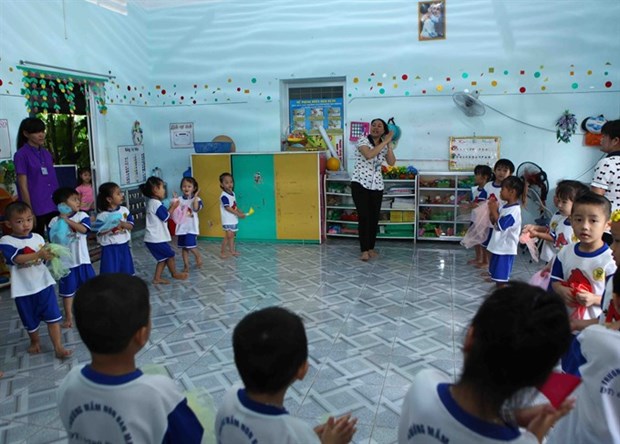Vietnamese kindergartens suffer from lack of support
The principal of a public kindergarten in the northern mountainous province of Lao Cai was recently suspended on charges of mistreating a four-year-old boy enrolled at the school.
 Illustrative image (Source: VNA)
Illustrative image (Source: VNA)Hanoi (VNA) - The principal of a public kindergarten in the northern mountainous province of Lao Cai was recently suspended on charges of mistreating a four-year-old boy enrolled at the school.
In a video clip recorded by the boy’s father, the principal was seen holding the student upside down over a chicken plucking machine. With the help of another teacher, the principal threatened to put the child in the machine, in an attempt to stop him from crying.
The incident was just one in a series of recent child abuse scandals at kindergartens that have caused public uproar across the country. These included a teacher using slippers to slap a child, and another case in which a teacher held up a child and threatened to throw him out of a window.
They highlight the perennial problem of substandard education at kindergartens, the grade that should receive the most attention from professionals, according to experts.
The lack of qualified teachers is a major reason behind the spate of scandals, said Dr Ho Lam Hong from the Education Research Institute at Hanoi National University of Education.
The period when children are under six years old is the most crucial in the development of personality and thus it is very important that children have “very good teachers,” Hong said.
However, the role of a childcare worker has not received due respect in society and thus kindergarten teachers are both underestimated and underpaid, she said.
A recent policy among some localities is to transfer ‘redundant’ teachers from high schools and junior high schools to work as kindergarten teachers. This is a clear example of such underestimation, Hong said.
Nguyen Thi Nghia, deputy minister of education, agreed that the quality of the teacher is the decisive factor to ensure quality of education.
“Kindergarten is a specific grade of education. Kindergarten teachers need to have specialised knowledge and skills to provide children with the best teaching and care,” she said.
Despite the important role played by kindergarten teachers, the salary they receive is often meager.
A newly graduated teacher who works for a public kindergarten receives about 2 million VND (88 USD) a month. Even those with 6-10 years of experience receive just 5 million VND.
The strenuous work with low financial reward has been attributed to the severe shortage of teachers nationwide.
According to an estimate released in January by the Ministry of Education and Training (MoET), public kindergartens nationwide lack more than 32,500 teachers. Figures for the private sector are not available, but the situation there seems little better.
Nguyen Mai T, a mother in Hoang Mai district, Hanoi, said she had to send her child to a private facility as there was no space for her child at a public school.
“There were two teachers looking after my son’s class in the beginning. But after several months, teachers were changing constantly. Some even looked more like domestic helpers than qualified teachers,” she said.
An owner of a private kindergarten in Tay Son street, Hanoi said it was a huge burden for the school to maintain a consistent number of employees.
“A teacher can work today and quit tomorrow without any notice. Many teachers regard the job as temporary while they are looking for other work. Once they find a better opportunity, they leave.”
A representative of Hanoi’s Department of Education admitted that the situation is common to private kindergartens.
In many cases, when inspection teams from the ward or district authorities visit the facilities, the lists of teachers are different from those the schools have sent to the authorities, as a number of teachers have already quit.
Unlike elementary and junior high schools, kindergarten schooling for children under five is not regulated as compulsory education under the Constitution.
“This is a disadvantage for pre-school education,” said Professor Dao Trong Thi, former chairman of the National Assembly’s Committee of Culture, Education, Youth and Children.
The number of kindergartens, both public and private, currently only meet 25 percent of social demand, according to Prof Thi.
A recent report by the MoET shows State spending for kindergarten education accounts on average 11-12 percent of overall education spending.
The average State spending for a child at kindergarten level is about 5.5 million VND per year, of which 83 percent is spent on teachers’ salaries. Only 17 percent goes to facilities, educational programmes and other investments.
The figures are said to be too low compared to the important role played by kindergartens, experts say.
Le Minh Ha, former head of the Pre-school Education Department of the MoET, said the National Assembly and Government’s target of making pre-schooling mandatory for 5-year-old children has not been realised due to budget constraints.
“Many rural areas suffer from serious shortage of solidly-built kindergarten classrooms for children. For example, in Kon Tum province, only 0.7 percent of classrooms are solidly built,” she said.
Ha also pointed out the absence of investment priority to pre-school education. “There is only one progamme of pre-school education that receives loans from official development assistance (ODA), while many programmes of elementary education do.”
Another problem is the unfair policy towards public and private kindergartens, Ha said.
While the number of public kindergartens is far from enough, private kindergartens receive no financial support from the State, and neither do the children enrolled in these establishments.
Prof Thi agreed, saying that it is very unfair that children in private kindergartens don’t get any State support.
“The different policy can be accepted at higher grades of education, but it should not be the case for pre-school. It should receive much more attention,” Thi said.
Thi said the State should boost support for the private sector with favourable policies in terms of land, bank loans, and teacher training.
Ha suggested applying the model used in many other countries, where investment in pre-schooling is paid per child, regardless of public or private concerns.-VNA













